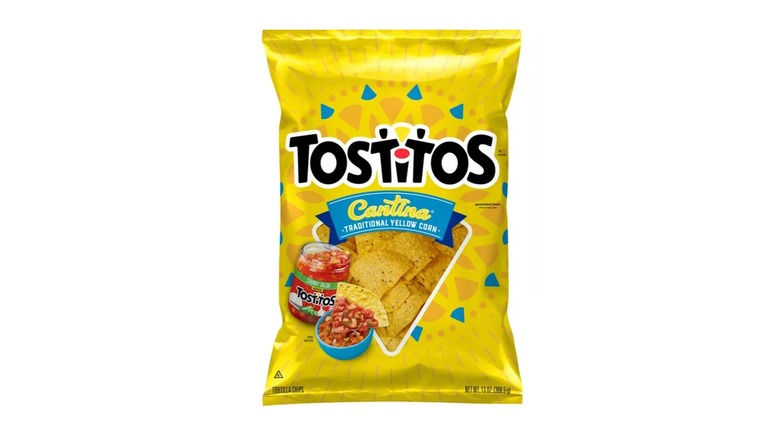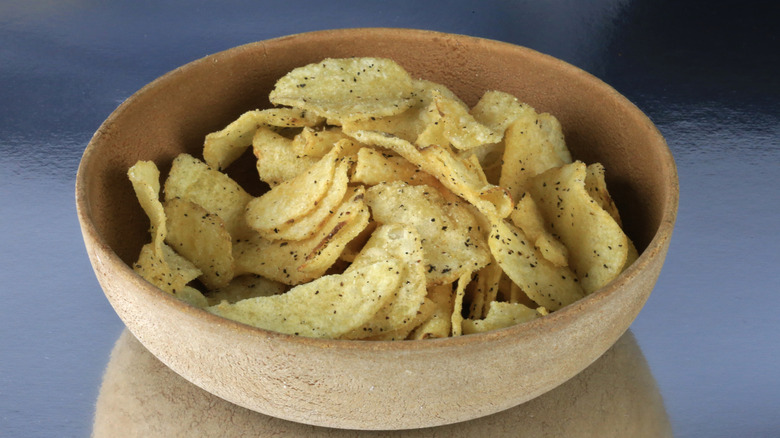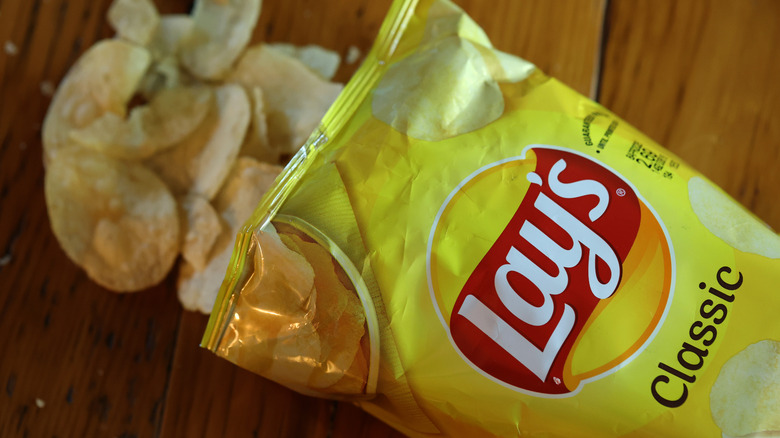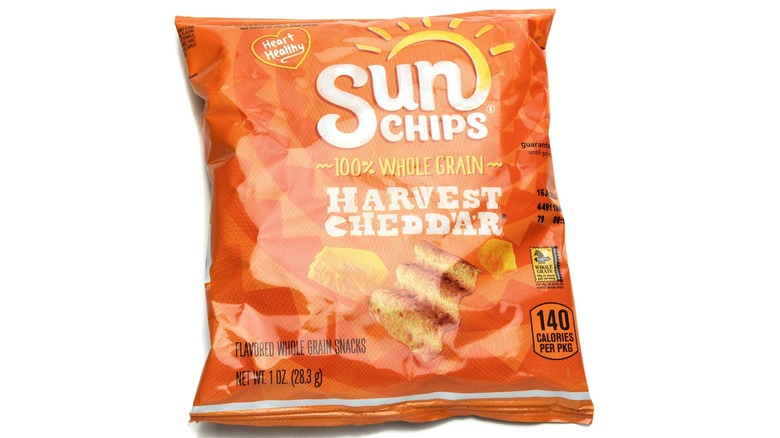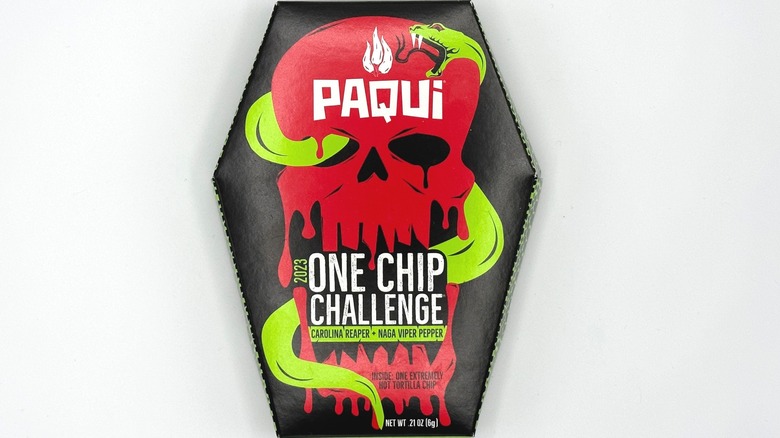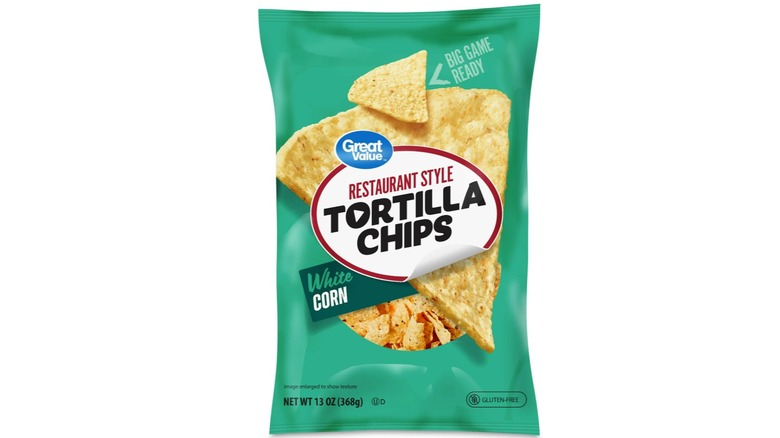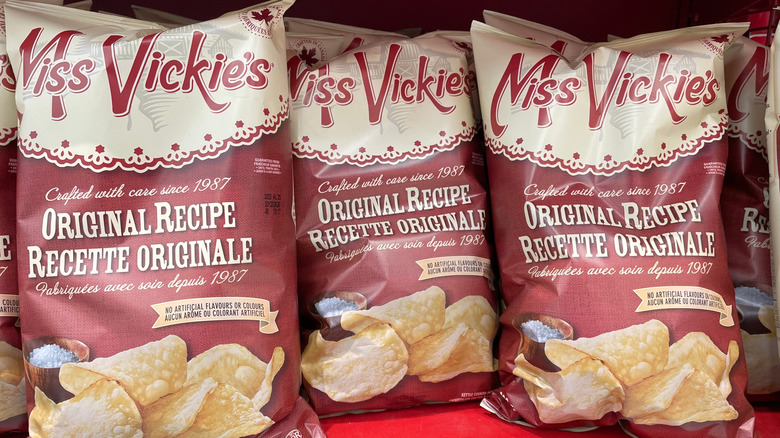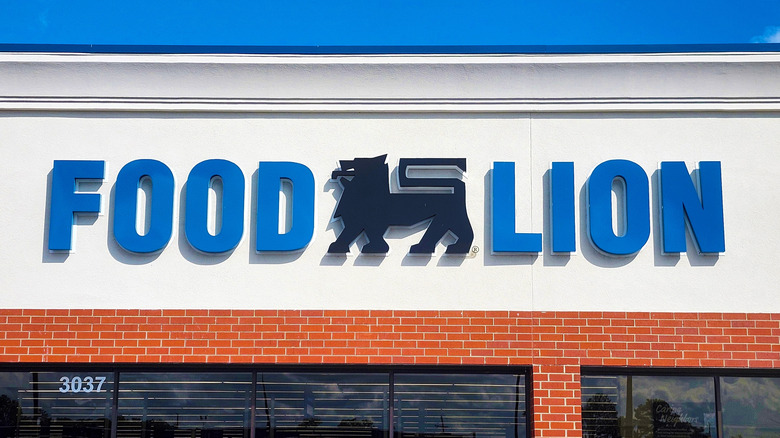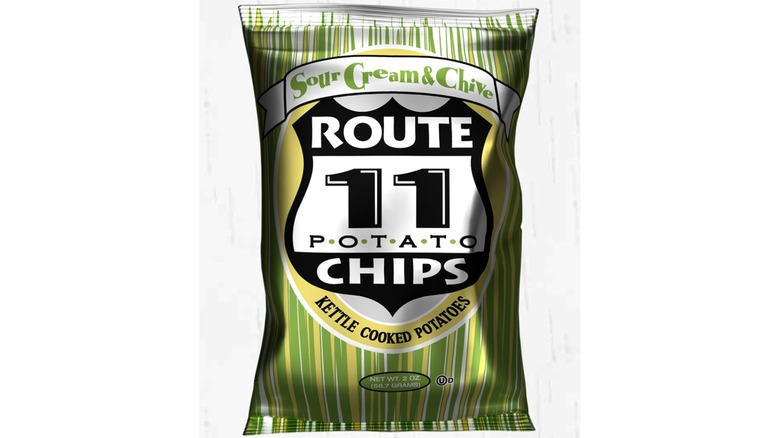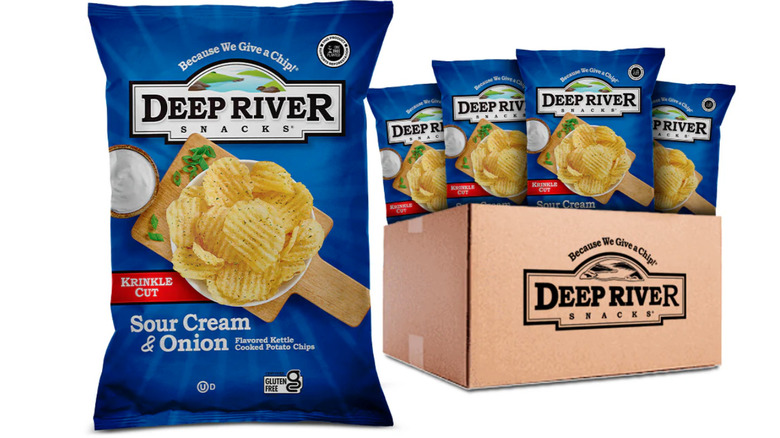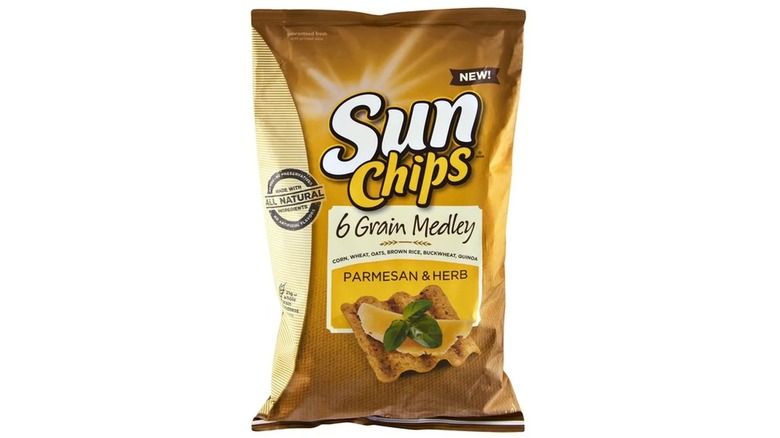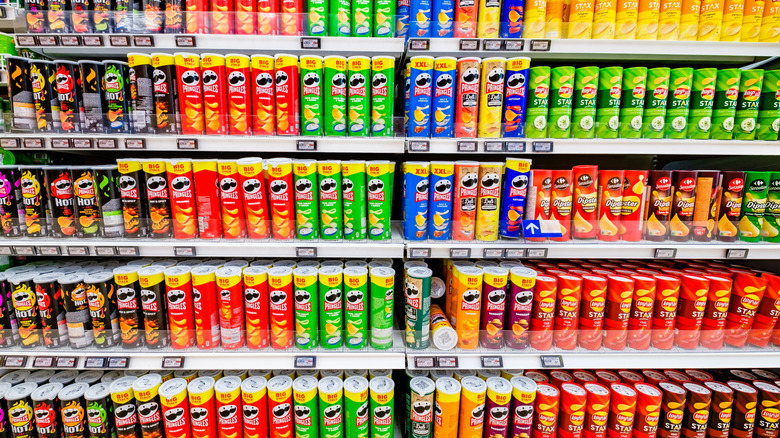The Biggest Potato Chip Recalls In US History
The chip aisle should be a sacred place with options aplenty. Most of the time, it is, with the only real concerns being a spike in cholesterol and some greasy palms. However, on occasion, recalls rear their ugly heads and sully this sanctuary of fried potato savoriness. The sad fact of life is that sometimes the comfort food one thought they could depend on for a late-night snack or a side to their favorite sammie might actually be defective.
While it doesn't happen too often, food recalls are getting more and more prominent. In light of this, we have scoured history for some of the more significant potato chip recalls. Recent years featured heavily in this list all the way up to 2025, but it may be surprising to see some popular chip brands struggle with quality in decades past. From mislabeled ingredient lists and ingredient contamination to fatal tragedies, here are the biggest recalls in potato chip history.
Frito-Lay recalled Tostitos Cantina Tortilla Chips that could contain dairy (2025)
Frito-Lay announced a chip recall for undeclared dairy in March of 2025. The company's Tostitos brand was the target of the recall, with the Cantina Traditional Yellow Tortilla chips having over 1,000 bags pulled from shelves. The affected products were spread over 13 states, not including purchases made through online vendors.
Though the Tostitos recall was for undeclared milk, it was not a labeling issue. Somehow, the brand's nacho cheese flavored chips were included in some of the affected bags. Tostitos' Nacho Cheese chips do include dairy, making it hazardous for those with an allergy to enjoy an otherwise safe bag of chips. If dairy isn't an issue for consumers, the recalled bags pose no risk other than the possibility of a cheesy chip every once in a while.
Food Express USA recalled Coyote Valley chips due to high salt content (2025)
Most chips are pretty salty, and you expect a bit of a bite from the salt when munching on the high sodium snack. Food labels and ingredient lists are great tools to help figure out just how salty a snack is going to be. When you check them, you're acting under the assumption that the labels are accurate. Inaccurate food labels are a recall-worthy mistake, as Food Express USA can attest to. Over 3,000 cases, which contained over 60,000 bags, of the company's Coyote Valley Sour Cream and Onion chips were recalled in January of 2025 for listing the wrong sodium information.
This recall was not mandated, but the chips were pulled from three states by Food Express USA. This recall went somewhat under the radar, and that may be due to Coyote Valley chips not being available for purchase to the mass market. Food Express USA supplies snacks to commissaries for those who are incarcerated to purchase.
Though the disparity of sodium between the incorrect label and what is really in the chips was unclear and unreported, the recall appeared to be a responsible one. When you eat too much salt, both your heart and kidneys can be negatively impacted. For those tracking their salt intake, an accurate label is vital.
Frito-Lay recalled Lay's Classic Potato Chips for undeclared allergen (2024)
The ingredients list on products is there for a very important reason. Sure, some of us may glance at the long list of hard to pronounce chemical names and wonder what they mean. Others, however, need the list in order to ensure they can eat the product without fear of an allergic reaction. While some allergies can simply make a person uncomfortable for a short time, others have life threatening allergies. It's the responsibility of companies to provide accurate ingredient lists — people's lives could quite literally depend on it. It's for this exact reason why Frito-Lay recalled 6,344 bags of its classic potato chips in December 2024.
The official reason for the recall of Lay's Classic Potato Chips (one of the best ranked Lay's flavors) was stated as undeclared milk. This doesn't sound like a huge deal, except to those with dairy allergies. Frito-Lay pulled over 6,000 bags of its classic chips from outlets in Oregon and Washington. Though only two states worth of chips were seemingly affected, the severity of the health implications concerning this recall was intense. The original recall was announced in December of 2024, but over a month later the Food and Drug Administration upped the recall to a Class I hazard. This meant that there was a reasonable possibility that consuming the recalled product could result in fatality or serious harm to health. Luckily, no reports of allergic reactions, small or otherwise, were reported due to this contaminated product.
Frito-Lay recalled SunChips due to possible seasoning contamination (2024)
Since entering the chip scene in the early '90s, SunChips have had two major recalls that have fallen on our radar. The most recent one happened in 2024 and aligns with quite a few other recalls of the time. Salmonella was found to be present in the facility where an ingredient was manufactured. While the chips themselves were unaffected, the seasoning used to flavor the Harvest Cheddar chips could have possibly been compromised. Officially, the recall was one of caution, as no salmonella was actively found in any of the seasoning used for the chips. The seasoning was used for the Harvest Cheddar flavor, and the Munchies Snack Mix also fell under the recall. Though no official numbers were released, the recall affected two of the most popular SunChips products, and 19 batch numbers fell under the product pull.
Salmonella has been at the heart of many recent foodborne epidemics, and is a bacteria that shouldn't be treated lightly. Luckily, no reported cases of sickness were associated with this recall. The caution is warranted and likely appreciated, as the recall occurred at the tail end of a salmonella outbreak in Canada.
Paqui recalled One Chip Challenge after a child's death (2023)
If lucky, companies are able to recall products before there are any serious consequences from less than ideal products. Occasionally, though, tragedy hits, and Paqui's One Chip Challenge resulted in the death of one teen back in 2023. The product in question consisted of a single chip that measured well over a million on the Scoville scale. Unlike most snacks, this chip wasn't designed for taste, but for pain.
A 14-year-old went into cardiac arrest after eating the chip. His autopsy linked the fatal event to the chip's high amount of capsaicin, a chemical that makes peppers as spicy as they are. Paqui immediately pulled 100% of its One Chip Challenge chips from shelves and ceased shipments following the tragedy.
Paqui released a statement regretting the unfortunate loss of life, but claimed the chip was strictly for adult challengers only. The challenged packaging also warned against those with health conditions attempting the challenge. The teen who passed did have a heart defect, but the company had seen an increased number of teen challengers, which also went into their decision to pull the product. Since the tragedy, Paqui as a whole has been disbanded and any of the brand's products can only be found on the resale market.
Walmart recalled its Great Value brand tortilla chips due to foreign material threat (2022)
Oddly enough, metal in food products isn't as rare as it should be. Back in 2022, Walmart issued a recall for its Great Value brand tortilla chips due to the possibility of metal being present in bags. This affected over 25,000 bags of Great Value brand Restaurant Style White Tortilla Chips, but despite the large quantity of potentially contaminated product, this recall didn't harm consumers. Luckily, the issue was caught before any of the bags actually hit the shelves.
The 2,555 cases of white tortilla chips were shipped out to distribution centers, but did not get further in the distribution process before being destroyed. This is not to say that the recall didn't concern consumers, though. The news of the chips not hitting shelves did not make an appearance until after the initial recall alerted Walmart shoppers.
Walmart still carries Great Value brand tortilla chips, though the bag has seen a redesign. It's not clear if this redesign comes in direct response to the significant recall, but it's safe to say that consumers most likely did not appreciate the food scare.
Miss Vickie's recalled kettle potato chips after customers reported the presence of glass shards (2020)
Metal isn't the only foreign object that has found its way inside a chip bag, as Miss Vickie's had an issue with glass in its chips back in 2020. The chip brand is another name under the Frito-Lay umbrella that has found itself on this unfortunate list of recalls, and the presence of glass is a pretty serious offense. The brand issued a recall for a number of kettle chip flavors, then an additional recall for its original recipe kettle chip flavor. A full count of the chips pulled was not reported, but a wide range of products were affected. All together, 27 varieties of chip bags were recalled with even more batch numbers involved.
The Miss Vickie's product pull only happened after customers complained about the presence of glass in chip bags. While thankfully no one was seriously hurt by the presence of glass in their kettle chips, one consumer did report an injury to their tooth. Considering the potential for serious harm from eating glass, this is a minor, but unacceptable, injury.
Consumers could have purchased the affected bags of chips either in vending machines or stores. However, bags sold online were also included in the recall. It appeared as though the majority of the chips were distributed and sold, with the stress being put on the urging of consumers to check their homes.
Food Lion recalled dill pickle potato chips for undeclared milk (2018)
Everything dill pickle flavored was all the rage a few years ago, and pickle lovers still pick up the occasional odd pickled flavored product. Dill pickle flavored chips have lasted through the trend, though, and Food Lion's house brand saw a recall back in 2018. Despite the pickle flavor still being a popular product a lot of chip companies carry, Food Lion no longer sells its version of the chip. This may be due to the significant recall, which spanned more than 7,000 cases over several states.
The recall was over a labeling issue, in that the label neglected to warn the consumer of the presence of milk in the chips. Unfortunately, the inconsistency between the ingredients and the label was found only after there were negative consequences. A consumer with a dairy allergy had an allergic reaction to the chips. Luckily, it was not reported to be fatal. Any allergy not noted on a label is cause for major concern, and the recall very well could have prevented other more serious reactions from occurring.
Route 11 recalled chips due to possible seasoning contamination (2016)
It's not just the big box brands that have the occasional recall, the small guys sometimes have to pull products too. Route 11 is a regional, but popular, kettle chip brand found mostly in Virginia and surrounding areas, from mom and pop shops to mainstream grocery stores. The small batch chip brand prides itself on quality and its low impact on the environment. Since being founded in the early '90s, it has seen one recall to date, in 2016. This recall was due to an ingredient in the seasoning of one flavor of chips possibly being contaminated with salmonella.
The sour cream and chive kettle chips contained non-fat dry milk powder, which the FDA suspected to have been manufactured in or around poorly maintained and cleaned equipment. The lack of sanitation where this ingredient was made created the ideal environment for salmonella to thrive. In fact, FDA investigators did find records of salmonella being present in samples produced in the same plant, Valley Milk.
This recall was seemingly warranted, however no salmonella was actually found in any of the tested Route 11 chips or the dry milk powder seasoning ingredient. Luckily, no instances of salmonella were reported surrounding this product either.
Deep River recalled its kettle chips after salmonella scare (2016)
Another regional chip brand, Deep River, pulled its sour cream and onion kettle chips off shelves due to Valley Milk's poor sanitation issues in 2016. The same powdered milk ingredient found in Route 11's chips was also used in Deep River's chips. The Connecticut-based chip company recalled three batches of its sour cream and onion chips, in association with the much larger Valley Milk salmonella scare. Similarly to the other related recalls, no salmonella was found in the tested products and this recall was voluntary.
Around this same time, Deep River was involved in a class action lawsuit against it. The class action lawsuit was unrelated to salmonella, and instead cited a misleading label that claimed the chips were made with non-GMO ingredients. However, some of the same chips that were recalled were a part of this salmonella recall. The expiration dates cited in both the recall and the class action lawsuit line up with one another. Despite its 2016 troubles, Deep River and the sour cream chip is still going strong and distributed in mainstream stores, like TJ Maxx, across the country.
Frito-Lay recalled SunChips that possibly contained metal fragments (2013)
While chips can be a painful snack if you don't chew properly, you don't typically get seriously injured by chowing down on the savory snack food. It's a different story entirely when a handful of chips could contain metal, which very well could have been the reality for people buying SunChips back in 2013. Frito-Lay recalled over 13,000 bags of SunChips due to the possibility of metal having been baked into the chips.
This recall was not SunChip specific, as it originated from Dakota Specialty Milling, where a number of products were flagged. After the metal of a defective screen shed into the flour, a large number of recalls were put out to consumers. This included SunChips' Six Grain Medley Creamy Roasted Garlic and Parmesan & Herb flavors. Both of these flavors are no longer sold, so you won't find them on our favorite SunChips flavor ranking, but they were pretty popular before the metal scare entered the equation.
Proctor & Gamble recalled Pringles due to possible salmonella exposure (2010)
When we ranked some of the worst to best Pringle flavors, there were plenty of discontinued ones not included. Two of these oldie but goodie flavors haven't made much of an appearance on shelves since their significant recall back in 2010. Proctor & Gamble recalled the Restaurant Cravers Cheeseburger and Family Faves Taco Night flavors due to an ingredient that may have been contaminated with salmonella.
Nobody wants their midnight munchies to come with a side of salmonella, and this recall was a particularly bad case that rightfully caused snackers unease. The factory that produced the affected ingredient in these two Pringle flavors (along with a number of other food products sold by different brands that were also recalled) was found to keep deplorable conditions where it manufactured ingredients for consumption. Standing water, dirty equipment, and positive salmonella tests were found in the facility.
The Pringles recall was reported by Proctor & Gamble to affect around 0.5% of Pringles sold domestically. Even such a small percentage had the potential to be a large amount of product, though, given how popular Pringles were even in 2010. Not long after this significant recall, Proctor & Gamble looked to unload its ownership of Pringles, finally selling the brand in 2012.

